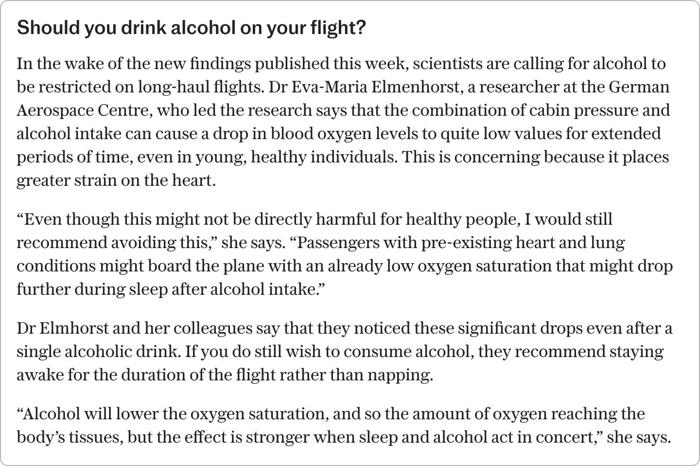Exactly what happens to your body when you step onto a plane – and how to stay healthy

A recent study found that flying can lower our blood pressure and increase our heart rate
Humans never evolved to be transported through the skies in a long metal tube at more than 500 miles per hour, so it’s perhaps unsurprising that aeroplane travel has some pretty unusual effects on our body.
A recent scientific study in the journal Thorax made headlines after finding that the cabin pressure at cruising altitude appears to lower blood pressure and increase heart rate, even among young, healthy passengers. This is particularly exacerbated by in-flight alcohol consumption, and as a result, the authors recommended either avoiding, or at least minimising the number of alcoholic drinks you have on a flight, especially if you have pre-existing heart problems.
Dr Stephen Hughes, a senior lecturer at Anglia Ruskin University and an emergency medicine consultant, says that there are a range of both physiological and psychological adaptations which happen to the body as a consequence of being on a plane.
To begin with, humans are not supposed to be at 35,000 feet, the typical cruising altitude of a commercial plane. At these heights, oxygen levels are so low that without the inbuilt cabin pressurisation system, we would rapidly lose consciousness. Instead, to allow the crew and passengers to breathe comfortably, the cabin simulates the kind of pressure we would experience at around 6,000-8,000 feet, around halfway up Mont Blanc.
“This leaves you slightly short of oxygen,” says Dr Hughes. “Not terribly short but slightly short which is why your blood pressure is lower.”
Some people are also more nervous fliers than others, triggering the release of stress hormones. “It’s an alien environment and you have no control, so people sometimes get anxious and over-breathe,” Dr Hughes explains. “Your heart rate might go up and that can be a risk factor for cardiac trouble. So you’ve got this interplay of the physiological and psychological.”
Dr Hughes is at pains to emphasise that the vast majority of the time, planes are extremely safe environments and adverse health events are incredibly rare, but these different factors help to explain why they do occasionally happen.
The more we understand the unusual environment of flying, the more we can take steps to make it a better and less stressful experience for our body. So from dehydration to circadian rhythms, this is how flying impacts you and what to do about it.
Don’t get dehydrated
At high altitudes, the air is almost completely devoid of moisture, with humidity levels on a plane often just 10 to 20 per cent, compared to 35 to 65 per cent in a normal everyday environment.
“That means people will breathe out water vapour, so they’re losing total body water and on a longer flight, you get very dehydrated,” says Dr Hughes.
He says that nervous fliers are even more prone to dehydration as a higher heart rate means that you will be breathing out even more water vapour. Drinking alcohol to relax your nerves can also exacerbate dehydration as alcohol is a diuretic, meaning it stimulates the kidneys to flush more fluid out of the blood and produce more urine. Instead of alcohol, Dr Matthew Goldman, a family medicine physician at the Cleveland Clinic, recommends aiming to consume around 250ml of water per hour.

However, as Dr Rosie Godeseth, an associate medical director at Vitality, explains, there are some simple steps you can take to mitigate the impact of dehydration and lessen any related discomfort.
“Drink plenty of water,” she says. “[Avoid] caffeinated and high sugar drinks, which can also have a similar effect to alcohol, dehydrating us further. Other easy steps include, wearing glasses instead of contact lenses if you wear them to reduce discomfort to your eyes, and applying a hydrating lotion or lip balm to avoid dry lips and skin.”
Wash your hands regularly to avoid catching viruses
Dr Godeseth explains that being in a low humidity environment for a number of hours, actively dries out the nasal passages increasing your chances of catching an infection.
“This dryness may make us more susceptible to catching a virus or bug, such as the common cold,” she says. “Additionally, like any environment where we are in close proximity to others, germs spread much easier throughout airborne particles or touching contaminated surfaces such as tray tables, seat belts and arm rests.”
To mitigate your risk, Dr Godeseth advises regularly washing your hands on the flight, trying to avoid touching your face with your hands and using hand sanitiser.
Walk around to keep your blood pumping
One of the problems with becoming too dehydrated during a flight is that your blood becomes a little thicker and more likely to clot, simply because there’s less fluid in it.
Dr Hughes says that being sat in a seat for many hours with your knees bent can cause blood to pool and stagnate in the veins of the lower limbs. “You’re impeding the drainage,” he says. “Having your legs stretched out may improve flow for a bit but not for long. Getting up for a walk now and then is really important because it allows the calf muscles to pump blood back towards the heart.”
Dr Goldman recommends standing up, walking around and stretching once an hour, particularly when you’re on a long-haul flight. “Perform leg exercises such as ankle circles and foot pumps,” he suggests. “And wear compression socks to help maintain circulation and reduce swelling.”
Eat bananas
Most airplane food comes with an extra dollop of seasoning, and one of the reasons for this is that a third of your taste buds stop working on high altitude, making the majority of foods seem rather bland. Your appetite is even impacted by the dry air on a plane, as this impacts the nose and appetite is intrinsically connected with our ability to sense the aroma of food.
Dr Godeseth says that you’re also less likely to feel hungry if you’re stressed. “For some people, the fight or flight response can kick in, disrupting hunger-regulating hormones like leptin,” she says. “Taste can also be affected as the cabin environment dulls our senses, with factors such as cabin lighting, stress, and even in-flight entertainment impacting how things taste to us.”
Because of this, she recommends taking light, easily digestible snacks on a plane such as bananas.
Get as much daylight as you can when you land to avoid sleep disruption
According to Dr Eva Winnebeck, a lecturer in chronobiology at the University of Surrey, there are three main aspects in which plane travel impacts your sleep. The first is the time of the flight – with morning flights which require you to be at the airport early, curtailing your sleep. The second is the flight itself, with noise, light, and uncomfortable seating often impacting your sleep quality.
But while there isn’t always much you can do about the first two, apart from booking an airport hotel to ensure you get a little more shuteye, there are certain steps you can take to mitigate the third – the impact of flying on your circadian rhythms.
Dr Winnebeck explains that the human body operates to a precise 24-hour clock which regulates all kinds of biological processes. Disruptions to this clock through switching time zones can impact how many enzymes are around to digest our food, how well our metabolism is working, bowel movement patterns, heart rate, cognition and of course sleep.
She says when we fly west, for example from the UK to the United States, you’re extending the day and so you need to slow down your circadian clock. “That’s usually easier to do, because the clock tends to be a little slow anyway, so people tend to find it easier to stay up for a little longer without too much sleep disruption,” she says.
However, when you fly east, for example from the US back to the UK, or from the UK to Asia, you’re actively speeding up your clock. “That’s much harder which is why people suffer from sleep inertia for a few days after landing where it’s hard to wake up or concentrate,” Dr Winnebeck explains.
To mitigate this, she advises sticking to the new time schedule as much as possible, getting as much daylight during the day as you can because this helps reset the circadian clock to the new time zone.
Avoid bloating and gut issues by keeping hydrated
Jet lag can also impact digestion for a couple of days, which is why Dr Winnebeck advises eating meals in the new time zone because the circadian rhythms which determine processes in the stomach and the liver react swiftly to the timing of food intake.
But simply being on a flight can also impact both your digestion and your gut in surprising ways. “The atmospheric pressure changes you find on planes are responsible here,” says Dr Godeseth. “As the plane ascends and descends, the cabin pressure fluctuates, and your digestive system adjusts to this pressure, leading to excess gas in your intestines. This can make you feel bloated and uncomfortable.”
Dr Goldman warns that the combination of shifts in cabin pressure and dehydration can affect bowel movements, occasionally triggering constipation. “My recommendations are to consider taking probiotics to support your gut microbiota,” he says. “Proper hydration also helps maintain gut motility.”
What to pack for your flight
- Light snacks: “It’s important to stay hydrated and choose light, easily digestible meals to combat these effects and a great easy snack is a banana as it is full of high value nutrients including magnesium and potassium,” says Dr Godeseth.
- Plenty of water: “The low humidity levels on aeroplanes make you more susceptible to dehydration, which can make you feel tired and lethargic. Drink plenty of water. Avoid caffeinated and high sugar drinks which can dehydrate you further.”
- Removable layers: “Because you’re at risk of dehydration, apply a hydrating lotion or lip balm to avoid dry lips and skin, and wear layers you can easily remove to avoid overheating,” explains Dr Godeseth. Dr Winnebeck agrees: “Dress like an onion.”
- Eye mask and ear plugs: To cover your eyes and shut out light, continues Dr Winnebeck who says headphones, a scarf or beanie hat could also do the job.
Recommended
You're never too old to fly but here are the health risks to consider
Read more
Play The Telegraph’s brilliant range of Puzzles - and feel brighter every day. Train your brain and boost your mood with PlusWord, the Mini Crossword, the fearsome Killer Sudoku and even the classic Cryptic Crossword.
